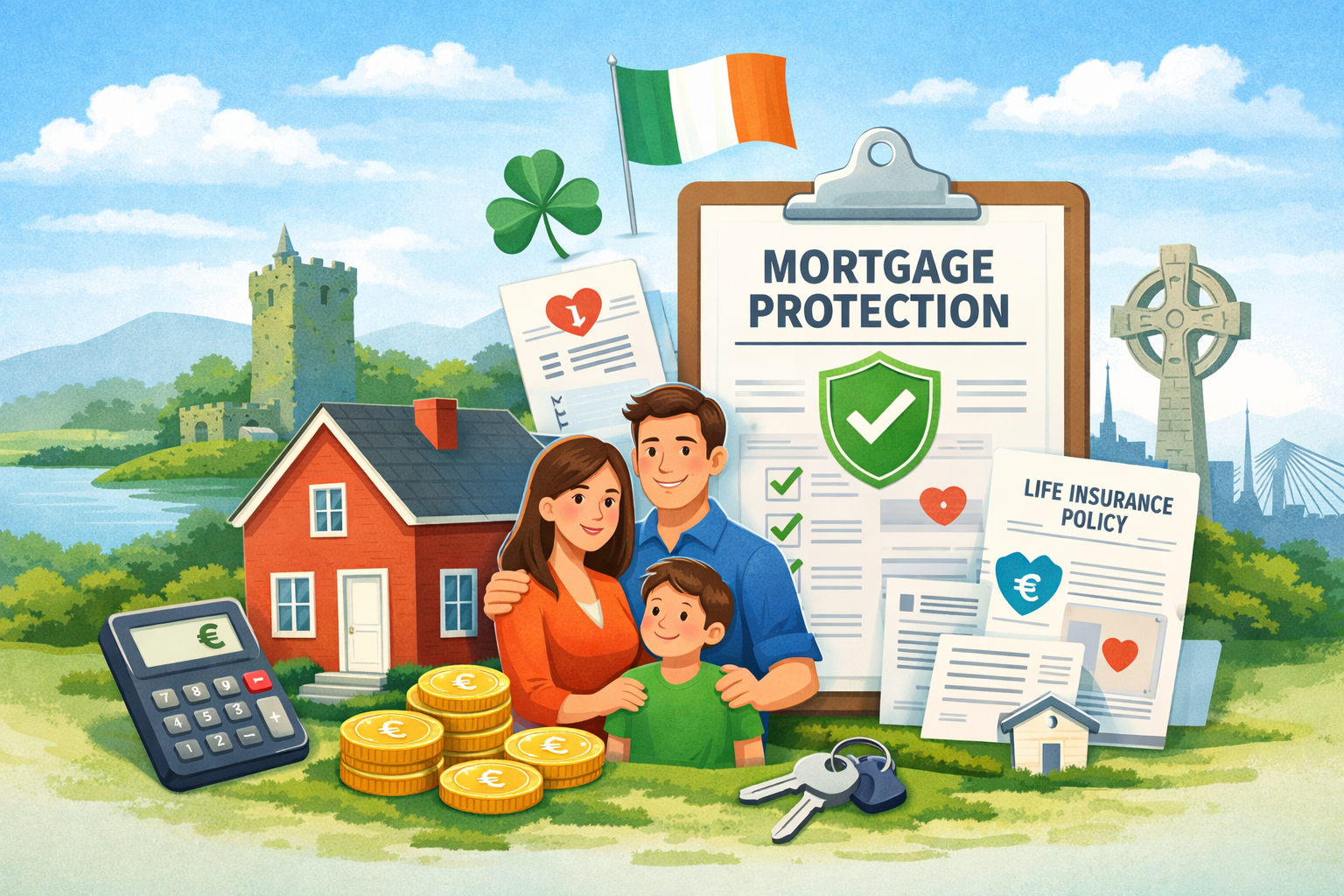Buying your first home is an exciting milestone, especially in a vibrant market like Ireland’s. For many, it’s the dream of owning property that drives them to navigate the complex landscape of mortgages. But where do you even begin? First-time buyer mortgages can seem daunting at first glance, with countless options and factors influencing how much you can borrow. Whether you’re eyeing a quaint cottage or a modern apartment in Dublin City Centre, understanding your borrowing potential is crucial.
This guide will illuminate everything you need to know about securing that all-important mortgage as a first-time buyer in Ireland. From essential factors affecting loan amounts to government schemes designed to help newcomers enter the housing market—you’re not alone on this journey.
Let’s dive into what it takes for first-time buyers like you to unlock the door to your new home!
Factors that Determine How Much You Can Borrow
When considering how much you can borrow for a mortgage, several key factors come into play.
- Your income is crucial. Lenders typically assess your salary and any additional earnings to gauge repayment capacity. The higher your income, the more likely you are to secure a larger loan.
- Credit history also plays a significant role. A strong credit score demonstrates reliability, making lenders more comfortable approving higher amounts. Conversely, poor credit may limit your options.
- Debt-to-income ratio is another important consideration. This figure compares your monthly debt payments to your gross monthly income. Lower ratios signal better financial health and can enhance borrowing possibilities.
- The size of your deposit matters too. A higher down payment reduces the lender’s risk and could lead to better terms or increased borrowing limits.
- Employment stability influences decisions; consistent job tenure often leads lenders to view applicants more favourably when determining loan amounts.
Types of Mortgages Available for First-Time Buyers
When it comes to first-time buyer mortgages in Ireland, several types cater to different needs and financial situations.
- One popular option is the fixed-rate mortgage. This choice allows you to lock in an interest rate for a specific period, offering predictable monthly payments.
- Another alternative is the variable-rate mortgage. With this option, your interest rate can fluctuate based on market conditions. While it might start lower than a fixed rate, there’s potential for increases over time.
- For those looking for flexibility, tracker mortgages could be appealing. These rates follow the European Central Bank’s base rate plus a margin set by lenders.
- Consider shared ownership schemes if affordability is an issue. This model enables you to buy a portion of the property while renting the remaining share from a housing association or developer.
Each type has its pros and cons; understanding them will help you make informed decisions as you navigate your home-buying journey.
Steps to Take Before Applying for a Mortgage
Before diving into the world of mortgages, preparation is key.
- Start by assessing your financial health. Gather documents that showcase your income, savings, and debts.
- Next, understanding your credit score is crucial. A higher score often means better mortgage rates. Check for any errors that could impact this number and resolve them if necessary.
- Create a budget to determine how much you can realistically afford in monthly repayments. This will guide you when using an Irish mortgage calculator to estimate potential borrowing limits.
- Research different lenders and types of mortgages available in Ireland, as options vary widely based on individual circumstances.
- Consider speaking with Money Maximising Advisors or other professionals who can provide tailored advice suited to first-time buyers like yourself. They offer insights into the best practices before embarking on this significant financial commitment.
How to Increase the Amount You Can Borrow
Improving your borrowing capacity can make a significant difference when applying for first-time buyer mortgages.
- Start by enhancing your credit score. A higher score indicates reliability to lenders, potentially increasing the amount they are willing to lend you.
- Next, consider reducing existing debts. Lowering outstanding loans or credit card balances positively impacts your debt-to-income ratio. This metric is crucial in determining how much mortgage you can afford.
- Increasing your savings is another smart strategy. A larger deposit not only reduces the loan amount but also demonstrates financial stability and responsibility.
- Securing a stable income plays a vital role, too. Lenders prefer applicants with a steady employment history as it suggests ongoing repayment capability.
By focusing on these areas, you’ll be better positioned to borrow more effectively for that dream home in Ireland.
Get expert mortgage advice in Ireland – book a free consultation with Money Maximising Advisors now.
Government Schemes for First-Time Buyers
The Irish government offers several schemes designed to assist first-time buyers in making their homeownership dreams a reality.
- One of the most notable is the Help to Buy scheme, which provides a tax rebate for those purchasing new homes. This can significantly reduce your upfront costs.
- Another option is the First Home Scheme, aimed at bridging the gap between what you can afford and property prices. Through this initiative, qualifying buyers receive equity support that helps boost their borrowing capacity.
- Additionally, some local authorities offer specific grants or assistance programs tailored to individual circumstances. These initiatives may vary by region, but they are worth exploring if you’re considering buying your first home.
- Understanding these options not only enhances your financial strategy but also opens doors that might have seemed closed otherwise. It’s essential to stay informed about eligibility criteria and deadlines associated with each scheme.
Common Mistakes First-Time Buyers Make with Mortgages
Many first-time buyers dive into mortgages without sufficient research. This hasty approach can lead to choosing the wrong mortgage type for their needs.
Another common blunder is not checking credit scores beforehand. A low score might hinder borrowing potential and result in higher interest rates.
First-time buyers often underestimate additional costs beyond monthly repayments, like insurance and maintenance fees. Neglecting these expenses can strain finances later.
Failing to shop around for the best deal is a missed opportunity. Buyers may settle for an unsuitable rate when numerous options exist.
Some overlook government help schemes designed specifically for them. Not exploring these resources could mean missing out on significant savings or benefits tailored to first-time homebuyers in Ireland.
Tips for First-Time Buyers to Maximise Borrowing
- Start by improving your credit score. A strong score can significantly boost the amount lenders are willing to offer you.
- Consider saving for a larger deposit. The more you can put down upfront, the less risk the lender sees in your application. Aim for at least 10%, if possible.
- Review your financial situation thoroughly. Cut unnecessary expenses and pay off existing debts before applying for a mortgage. This will demonstrate responsibility and enhance your appeal to lenders.
- Don’t overlook government schemes designed for first-time buyers in Ireland. These initiatives can provide additional support that boosts what you’re eligible to borrow.
- Engage with mortgage advisors who specialise in first-time buyer mortgages; their insights could lead you toward better deals or hidden opportunities tailored just for new homebuyers like yourself.
FAQs About First-Time Buyer Mortgages
Q1: What is the maximum amount I can borrow as a first-time buyer?
The maximum you can borrow depends on your income and existing debts. Lenders typically allow you to borrow up to 3.5 times your gross annual income, though this may vary.
Q2: How much deposit do I need for a mortgage?
Most lenders in Ireland require at least a 10% deposit of the property’s value. However, certain government-backed schemes may allow you to buy with a smaller deposit.
Q3: What are the typical mortgage terms available?
Mortgage terms usually range from 15 to 30 years. Choosing a longer term lowers monthly repayments but increases the overall interest paid.
Q4: How do interest rates affect my mortgage?
Interest rates vary across lenders and can significantly affect your monthly payments. Comparing lenders and using a mortgage calculator Ireland helps estimate potential costs.
Q5: Can I get government support as a first-time buyer?
Yes, you may qualify for assistance such as the First-Time Buyer Scheme Ireland or the Help-to-Buy incentive program, which can reduce the deposit or provide financial aid towards your purchase.
Conclusion
Purchasing your first home is a significant milestone, especially in Ireland’s dynamic property market. Understanding how much you can borrow with First Time Buyer Mortgages is crucial to making informed decisions.
Maximising the amount you can borrow often involves strategic planning—such as improving your credit score or saving for a larger deposit. Don’t overlook government schemes that support first-time buyers; these initiatives may provide significant assistance.
It’s easy to make mistakes during this journey, so staying aware of common pitfalls can save you time and money down the line. Practical tips designed specifically for first-time buyers will empower you in navigating mortgages effectively while maximising borrowing potential.
Ready to buy your first home? Speak to Money Maximising Advisors today and discover how much you can borrow.
- How does Equity in a Mortgage Work?
- Can you Release Equity on a Buy to Let Mortgage in Ireland?
- A Guide to Understanding Mortgages in Ireland
- Can You Do an Equity Release with a Mortgage in Ireland?
- Private vs. Public Sector Mortgages: Key Differences and Benefits
- Why Consider a Public Sector Mortgage for Your Next Property Purchase?
- Mortgages, Home Loans, and Housing Finance in Cork, Ireland
- First-Time Buyer Mortgages for Public Sector Workers: A Complete Guide
- Can you get a Buy-To-Let Mortgage in Ireland?










